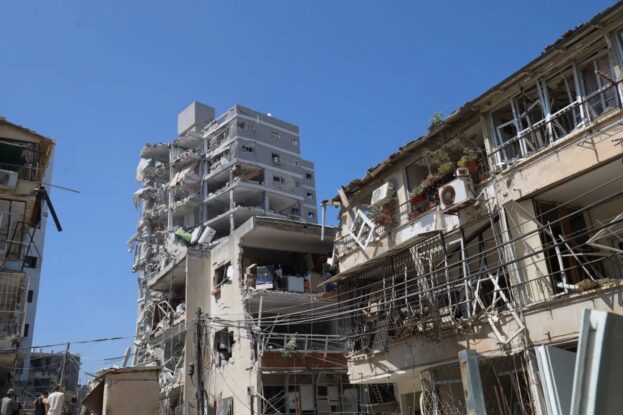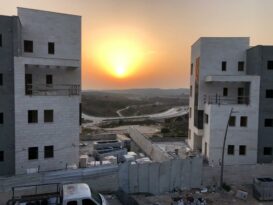For the first time in Israel, some of the country’s largest building contractors—including Danya Cebus—will take the lead on war-damage restoration for apartments hit by missiles from Iran during Operation Rising Lion. The work will be carried out under a new government program called ‘Rebuilding in Unity,’ which assigns each restoration zone to a single contractor operating under state supervision and in coordination with the local municipality. Residents won’t need to deal with contractors or navigate any bureaucracy themselves.
By Doron Breitman, Nadlan Center
A joint team from the Ministry of Finance, the Ministry of Construction and Housing, the Israel Tax Authority, and the Israel Builders Association announced Tuesday that, as part of the ‘Rebuilding in Unity; initiative—reported on in depth by Nadlan Center—Israel’s largest contractors will participate in war-damage restoration across zones hit by Iranian missile fire during Operation Rising Lion. As previously revealed by Nadlan Center, one of the companies involved is Danya Cebus.
For the first time in Israel, contractors known for large-scale projects will take on the restoration of private apartments, using an innovative model focused on area-wide renovations instead of individual units. Each zone will be assigned to a single contractor, operating under government supervision, in coordination with the local municipality and a management company appointed by the Property Tax Authority.
The war-damage restoration process will work as follows: municipalities will map out the affected areas and define them as “rehabilitation zones,” each including numerous buildings and infrastructure elements in need of repair. Each municipality will then reach out to residents within these zones and offer them the option to participate in the government-led war-damage restoration program. The local authority will pass along the details of interested residents to the Compensation Fund, whose representatives will verify their eligibility and then contact them directly.
Residents will not need to apply directly to the Compensation Fund to join the program. Instead, the Compensation Fund will evaluate the total damage in each designated zone and transfer the appropriate funds to an appointed management company, which will then pay the selected contractor and oversee the work. This government-backed pathway offers a streamlined solution that removes the burden from residents: they won’t need to deal with contractors, gather price quotes, or track the progress of renovations. The entire war-damage restoration process—including funding, oversight, and execution—is fully managed by the state.
“We are launching a national initiative without precedent—restoring damaged zones quickly, efficiently, and with full state responsibility,” said Finance Minister Bezalel Smotrich. “Instead of bureaucracy, service. Instead of delays, action. This is an innovative model that brings together all the key players, lifts the burden off citizens, and supports them from start to finish: from renovation to returning home. We will continue working together—government, local authorities, and communities—to prevail both on the frontlines and the home front, with the heart of a lion.”
“We are launching a clear and simple way forward for residents—no complicated forms, no delays or postponements, and no need to search for a contractor on their own,” said Housing and Construction Minister Haim Katz. “I thank all the partners who have stepped up for this national mission and are helping speed up the rehabilitation process.”
“The ‘Rebuilding in Unity’ project represents a paradigm shift in how we respond to war-related damage. We’re bringing the knowledge and expertise of Israel’s top contractors directly into people’s homes,” said Yehuda Morgenstern, Director General of the Ministry of Construction and Housing. “Our goal is to streamline the process, ensure high professional standards, and get residents back into their homes as quickly as possible. Thanks to our strong cooperation with the Tax Authority, local municipalities, and the Builders Association, we’ve created a professional and efficient framework that offers a solution for every resident whose home was damaged.”
“We are currently facing an unprecedented challenge—responding to around 45,000 direct damage claims, including some 35,000 for structural damage,” said Shai Aharonovitch, Director of the Tax Authority. “One of the biggest hurdles is the shortage of renovation contractors, and this government program is designed to address that. By grouping a large number of individual claims into a single restoration zone and assigning it to a major construction company, we can handle the work more efficiently. This approach allows us to involve companies that typically wouldn’t take on isolated cases and spares residents the burden of navigating the renovation and compensation process on their own.”
Roni Brik, President of the Israel Builders Association, said: “We are proud to take part in this national initiative to rapidly restore homes that were damaged. Israel’s largest contractors have answered the call and are stepping up—even though this kind of work is outside their usual scope. They’re bringing their expertise, resources, and manpower to help return people to their homes—and restore their hope. This effort reflects the strength of the construction industry and the deep sense of mutual responsibility that defines Israeli society in times of crisis.”

Nadlan Center is Israel’s leading real estate news and knowledge platform in Hebrew, created for industry professionals. Founded by experts in the field, it delivers in-depth, up-to-date coverage on urban renewal, planning and construction, taxation, and housing policy — tailored to the needs of developers, investors, planners, and financiers. In addition to its widely read news content, Nadlan Center hosts major industry events, professional conferences, and training programs that support the growth and development of the Israeli real estate sector.
Learn more: https://www.nadlancenter.co.il







